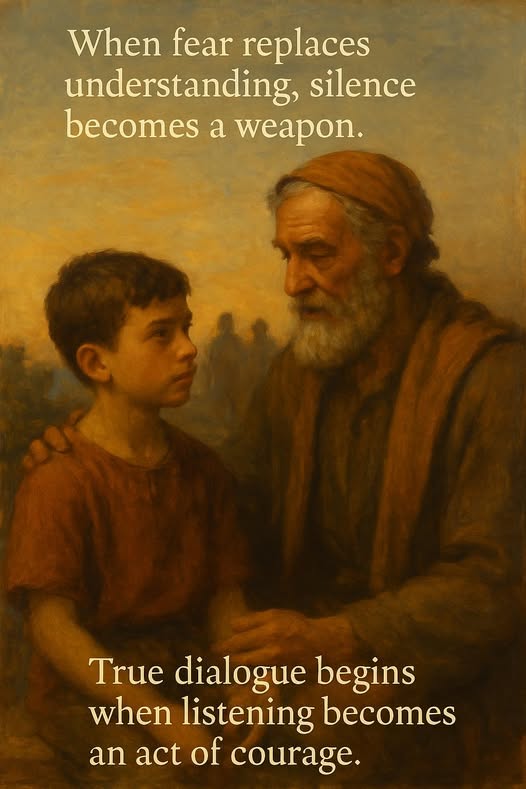
(When Listening Is Replaced by Control and Threatening)
It had been a long week at Emil’s school. Ever since he became class monitor, he had tried to create a space where everyone could speak openly, especially during class meetings and group work. But one new student, Soren, made that almost impossible.
Soren didn’t just disagree—he dismissed. If someone voiced an idea he didn’t like, he mocked it or shut them down. “That’s stupid,” he would say loudly, or, “You better not say that again if you don’t want trouble.” Some students laughed nervously, but most stayed quiet, their thoughts buried beneath the threat of being ridiculed or worse.
That Friday, Emil walked home with a heavy heart. “I tried to invite Soren to listen today,” he told his grandfather, “but he shut me down and warned everyone that they better agree with him, or else.”
His grandfather nodded slowly as they walked through the garden path. “It’s hard to create space for truth when fear is sitting in every chair,” he said. “There are people like Soren in every age—those who, unable to grasp the depth of a matter, try to silence it instead. Because once others truly understand, their control begins to crumble.”
Emil looked puzzled. “But why would someone fear understanding?”
Grandfather’s eyes narrowed with quiet gravity. “Because understanding leads to reason, and reason opens the door to change—and change threatens those who rely on ignorance to hold power.”
He paused, then added with deeper reflection, “Many prophets, Emil, were rejected not because they brought harm, but because their message was too vast for the people to grasp. The idea of One unseen Creator challenged the comfort of carved idols. Instead of opening their minds, many shut their ears—and in that refusal to comprehend, they condemned themselves to darkness. It’s the same in every age. Leaders who fail to understand the deeper nature of a problem—whether it’s the complexity of a region, the pain of a people, or even the destructive power of modern weapons—often choose war over wisdom. They act not from clarity, but from confusion masked as certainty. And it’s always the innocent who pay the price for their ignorance.”
They walked in silence for a few moments, and then Emil asked, “So what do I do?”
“You listen anyway,” Grandfather said. “You show by your example that real strength isn’t in silencing others but in hearing even what’s hard to hear. Dialogue is not for the easy days—it’s for when courage is needed most.”
That night, Emil wrote in his journal:
“Today I learned that silence can be a weapon… but so can listening. And when the winds are loud with fear, the whisper of truth matters more than ever.”
The next day, Emil approached Soren—not with defiance, but with calm clarity.
“Soren,” he said, “you don’t have to agree with us. But you do have to let others speak. Shutting people down with threats doesn’t prove you’re right. It just proves you’re afraid of being questioned.”
Soren glared. “What if I don’t care?”
“Then you’ll lose the only thing that makes this class a community: respect. We’re here to learn, not to silence. Listening is not weakness. It’s how we grow.”
Soren didn’t respond right away. But something in Emil’s voice—not hostile, not scared—held him still. For the first time, he didn’t interrupt.

